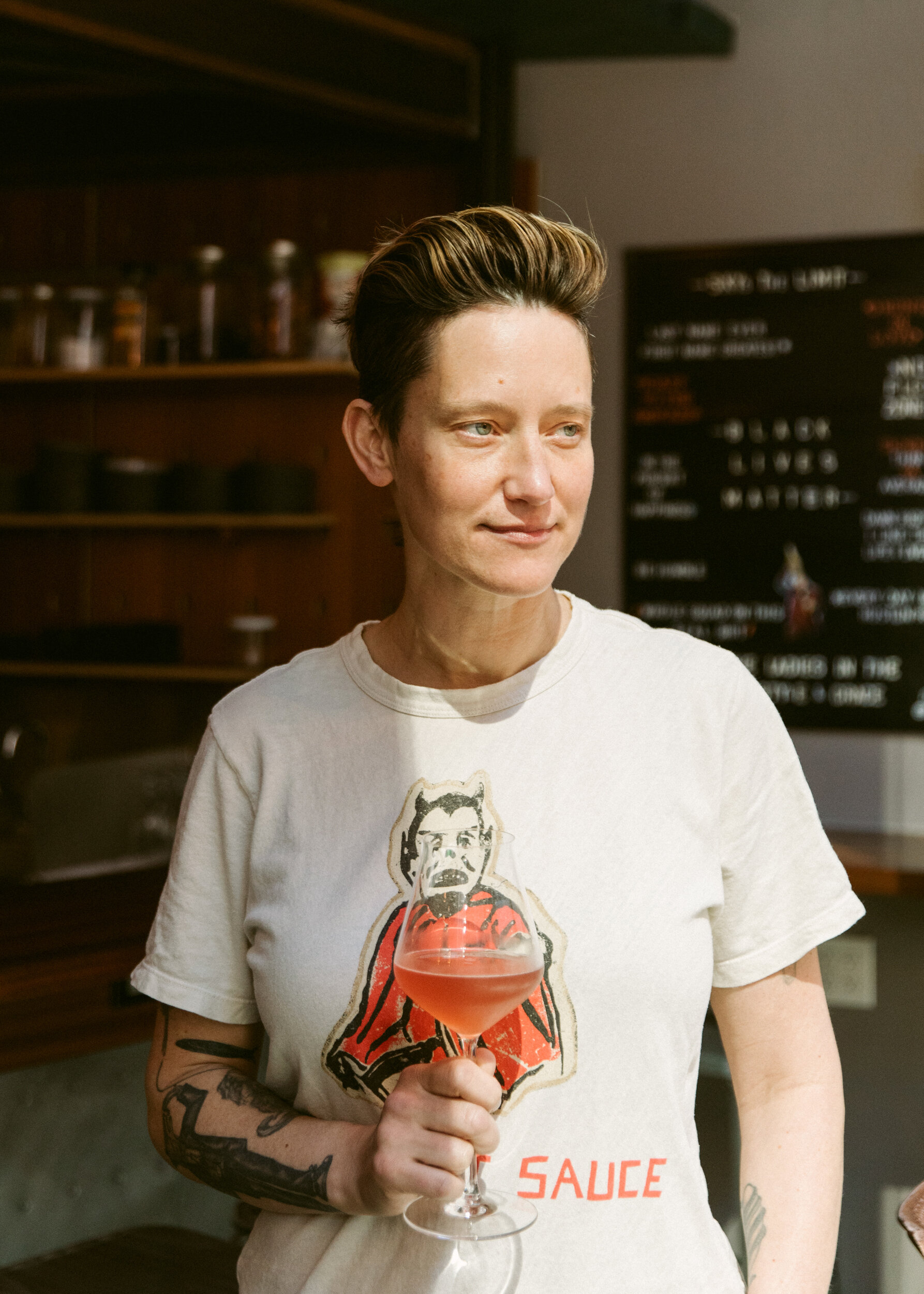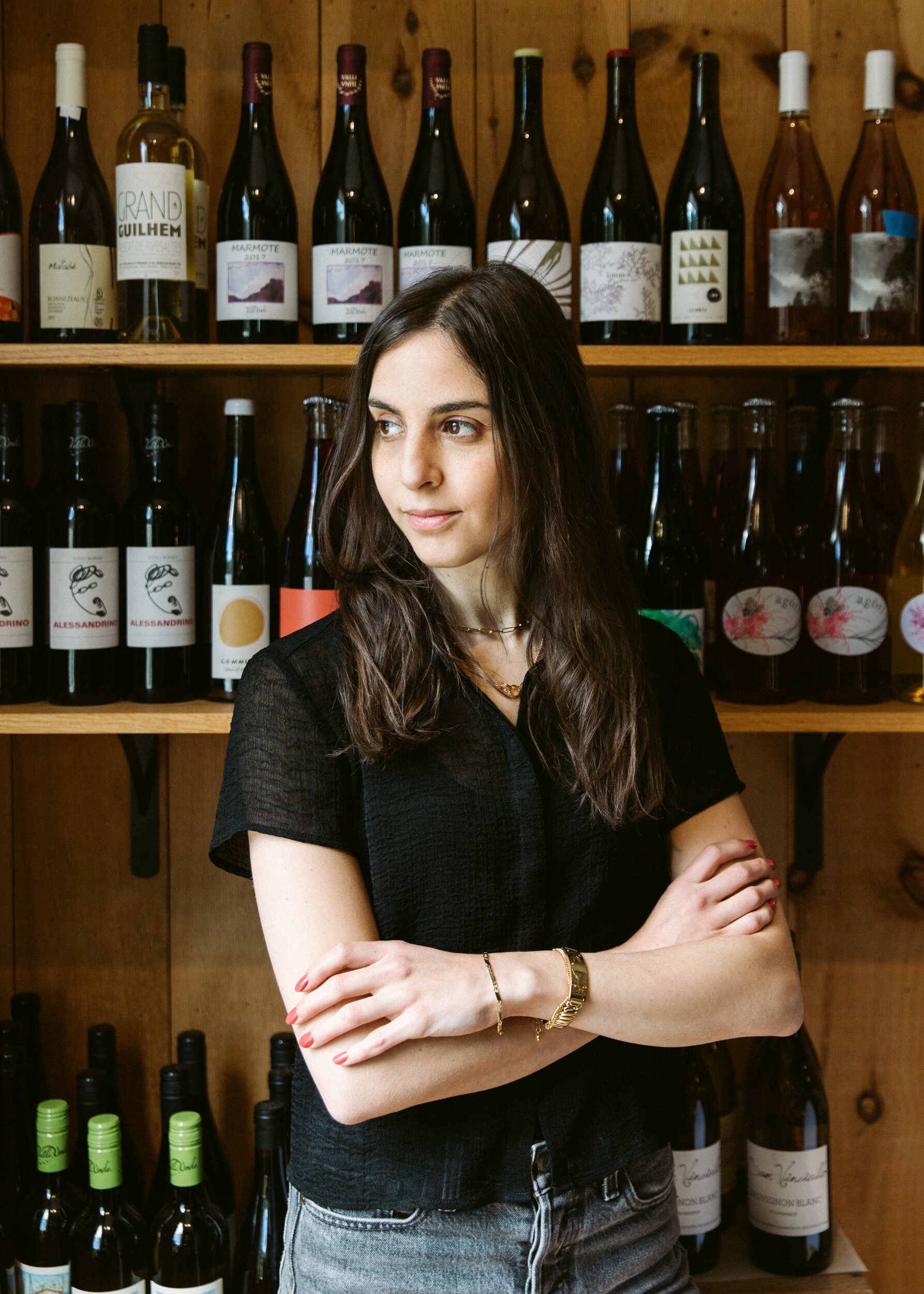Natural Wine: Authenticity, Fluidity, Inclusivity
All photos by Jesika Theos
"Natural wine” can mean different things to different people. But in its essence, natural wine is made with respect for Mother Nature and the environment, a wine made honestly and truthfully. It is wine capturing soul, echoed from soil to vine to grape and the hands that harvest.
What began as a simple roundup of “women in natural wine” evolved into a narrative of identity, inclusivity and community. I wanted to get to the heart of the matter. “What do you feel when you hear or read the phrase ‘women in wine,’” I asked 12 natural wine professionals in and around Greater Boston. Their responses—rich and evocative, filled with integrity, authenticity, respect and positive, progressive change, swept me up and away. In the end, what matters most to these vintners is the passion and knowledge that they—and the winemakers they represent— bring to their chosen metière.
Caitlin Frame and Laura Poladsky of Sunnys
Generosity of spirit and kindness come to mind when I speak with CAITLIN FRAME and LAURA POLADSKY, who opened Sunnys, a natural wine shop in Amesbury, in the eye of the pandemic. It takes courage to uproot from a pulsating, diverse city like New York to a quaint New England town.
“Being here is an opportunity to honor and share who we are. We asked ourselves ‘What positive changes can we make to the community with Sunnys?’ We always circle back to being authentic, and loving ourselves—which is so much. You have to hold that in your heart. It frees you, too. Natural wine is our inspiration. It isn’t trying to change itself. In its individualistic, authentic self, it becomes a wine which is whole.”
La Grange aux Belles La Chaussee Rouge is a spirited blend of Cabernet Franc and Grolleau, from Anjou in France’s Loire Valley. “A perfectly inviting and unpretentious summer wine, one to put down on any table! It’s distributed by Giannoni Selections, home to a small selection of minimal-intervention wines. Owner Gemma Iannoni introduced us to this wine and we couldn’t be happier about it.”
Haley Fortier of haley.henry and nathálie
HALEY FORTIER is the owner of two natural wine bars in Boston, haley.henry and nathálie. Being in Fortier’s presence inspires respect, appreciation and support, which resonates in both establishments and sets the tone.
“It’s all about the people—our staff, winemakers, vendors, customers. They become your community, and supporting your community is imperative. It fosters mutual respect. When it comes to wine, we focus on the farmer and small production wines. It’s all an investment into, and an extension of our beliefs.”
“Women in wine, yes, I get it, but at what point do we stop asking and assessing this? We opened nathálie in the heart of the ‘Me Too movement,’ and we wanted to increase our focus on social inclusion for all, above and beyond what we were already doing. What matters is doing something you feel is for the better good.”
“Maysara Winery, in Oregon’s Willamette Valley, is a true salt-of-the-earth story. The family escaped Iran in the late ’70s due to the Iranian Revolution and hostage crisis. They came to the U.S. through Mexico, where the father applied for political asylum. The three daughters make a sparkling Pinot Noir with tiny bubbles that *POP* into gorgeous flavors.”
Lauren Friel of Rebel Rebel, Wild Child and Dear Annie
Kind and inspirational, LAUREN FRIEL, owner of natural wine bar Rebel Rebel in Somerville, opened Wild Child nearby last year. “We wanted to focus on a more inclusive environment, and asked ourselves ‘How can we help those with limited resources or experience become a part of the wine community?’ Dear Annie, a collaboration with Field and Vine, will also be a place which continues to support community and queer rights. It will be a fluid space which feels nurturing and safe for everyone.”
“I don’t think ‘women in wine’ is a negative. I think what happens is that women begin to talk about the challenges they have faced. We’re asked to question ‘What is the whole picture of our identity, and our position in our industry, and what are we doing to make a difference?’ Be proud to be a woman, but also look at those who are waiting and wanting for opportunity.”
“Natural wine for me is produced in a way that isn’t detrimental to the environment and our bodies. It’s representative and reflective of place and tradition, and reflects my values. Megan Bell of Margins Wine in Clarksburg, California is making wines from vineyards she says are ‘on the margins.’ Her skin-contact Muscat is like sitting in an orange grove with your best friend—it’s invigorating and joyful in a way few wines are.”
Kimberly Scott of The Wine Bottega
KIMBERLY SCOTT took charge of The Wine Bottega in Boston’s North End five years ago and turned it into the city’s first natural wine shop. Scott has a poignant ability to turn introspection and intellect into poetic prose.
“Women in wine. We need to be open to other categories of gender identification. Gender assumption can be harmful. We need to be sensitive and supportive of non-binary narratives, I know this well as someone who identifies as genderqueer, and I want to do my part to open people to other categories.”
“For me, wine is a connection between human beings and the natural world, and a window into the miraculous nature of existence. It is a relationship which evokes emotion, and its identity is an extension of both farmer, land and the weight of labor.”
“Natural wine is clean farming, and interconnected to the care of Mother Earth, which is of course a living thing, which holds its own energy and is greater than the sum of its parts. Bianka and Daniel Schmitt, a true mind and heart convergence, are a dynamic duo of German winemakers in the Rheinhessen. Their ‘Rot,’ an energetic red blend, is the most sanguine bottle I’ve ever had.”
Danielle Pattavina of Momma’s Grocery + Wine
DANIELLE PATTAVINA, a thoughtful steward of inclusivity, will soon open neighborhood convenience store Momma’s at 75 Dudley Street in Cambridge. “The name Momma’s conjures comfort and safety. The wines will be natural, and it will be a place to come together and inspire and support one another. All will be welcome.”
“I don’t think of myself as doing something ‘alternative,’ and I don’t think of myself as a ‘woman in wine.’ I don’t really put ‘gender’ on wine. Gender is fluid, evolving, freedom to be oneself in one’s unique individual being. Natural wine, too, is freedom; wines made with minimal intervention in the field and cellar.”
“I always love the Heidi & Hubert Hausherr wines from Alsace. The wines are wild, unpredictable & transportive. These are farmers making wine. This is a producer from SOPHIE KZIRIAN of Cambridge-based Violette Wine Imports, who I love to support.” Sophie inherited her father’s mindset and passion for truthful wines, wines of integrity, and says “if you’re feeling the genuine, you resonate the genuine!”
Sophie Kzirian of Violette Wine Imports
Danielle Glantz of Pastaio Via Corta
DANIELLE GLANTZ—dedicated, impassioned and loyal—owns Pastaio Via Corta in Gloucester, which celebrates fresh, organic stone ground pasta; natural, low-intervention wines; and real Italian provisions.
“Women in wine, yes, it’s important, but how about people as humans? It’s OK to reference women in wine, but gender inclusivity is equally important. I don’t want to genderize myself, nor my female winemakers. It is about respect.”
“Natural wine to me is wine that is made with a respect for Mother Nature. Sometimes the result isn’t perfect, but beauty exists in imperfections. I made a commitment to support Matt Mollo of SelectioNaturel. I carry every wine in his portfolio. Collecapretta Il Rosato di Casa Mattioli is produced in the heart of Umbria. Vittorio, Anna and their daughter Annalisa take a minimal-intervention approach.” Made entirely of fragrant black varietal Ciliegiolo, this rosato personifies summer’s swoon.
Lindsay Porter of Sea & Cellar
Tiny, inviting and located at the entrance to Bearskin Neck in Rockport sits Sea & Cellar, a darling of a natural wine shop, owned by the passionate LINDSAY PORTER. “My experience as a woman working in wine so far has been very positive. I am not afraid to say I am not familiar or need more education in any area, which to some can be seen as a sign of weakness, but for me, I see it as an opportunity.”
“I have made it my mission to make the wine I carry as transparent as possible for the consumer, acknowledging that there are small producers working hard to preserve their land and their varietals in a way that is respectful and harmonious with nature.” “
Martha Stoumen’s Mendocino Benchlands ripe, fresh blend of Nero d’Avola and Zinfandel from California is imported by SelectioNaturel, and is a great example. I admire Martha for her dedication and determination. Her winery ‘was founded upon the desire to recapture a winemaking culture of patience, one which has all but faded away.’”
“I have cancer, which essentially necessitated the evisceration of my entire female reproductive system,” shared HELEN GALLO BRYAN. “So when I think about gender and women, does what I have gone through make me any less of a woman? It’s an interesting question.”
Based in Boston, Gallo Bryan (no relation to the California wine family) has worked in the wine industry for four decades and is beloved by the wine community as a tireless and passionate mentor. She is the sales director for Vero, an importer and distributor of natural Italian wines, founded by Sheila Donohue, who lives in Italy.
“Vero is forging a community: women supporting women, connecting passion from the winemaker to the importer to the customer. Our first wines to launch in Massachusetts come from winemaker Antonella Manuli of Fattoria La Maliosa in Tuscany. Antonella collaborated with agronomist Lorenzo Corino to patent the Corino Method, a back-to-basics farming initiative that focuses on regenerative farming and the health of the environment, avoiding anything that counters the natural process of obtaining and maturing wines—essentially the foundation of natural winemaking. Her Saturnia Bianco, an unfiltered, extended-skin-contact blend of Procanico and Trebbiano, is a wine of grace and gumption, like Antonella.”
ALEXIS HARWOOD is an artist at heart whose shop reflects a beautiful looking-glass invitation into her aesthetic. Helen’s Bottle Shop in Manchester-by-the-Sea is where you will find natural wine and good company.
“For me, natural wine has soul, a heartbeat, a sense of place, and strikes a very delicate balance between nature versus nurture. Colle Jano’s Verdicchio from Le Marche in Italy is imported by Mucci Imports. They seek truthful expressions in the wines they offer, and this Verdicchio from wife and husband Giulia and Filippo is mineral laced, floral and rich with character, a true sense-of-place wine.”
“I have to say, the phrase ‘women in wine’ brings me to the vineyard. Vines are not gender biased—that is a human construct—and I think, in terms of definition and identity, in many ways we still have a long way to go.”










